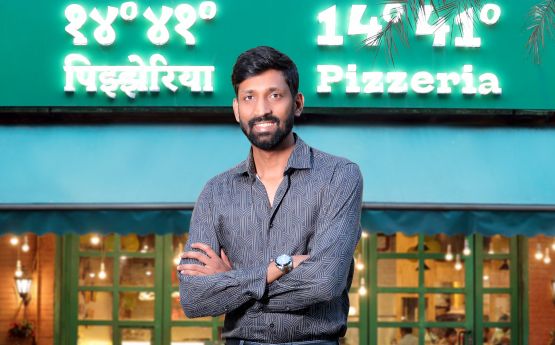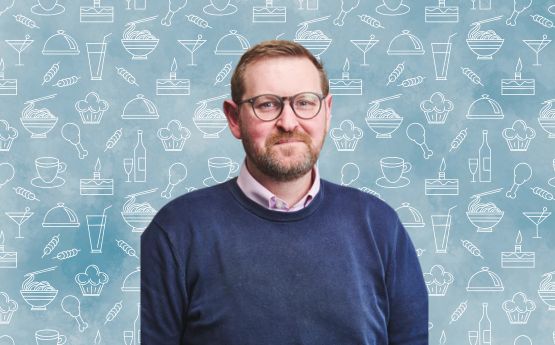Joelle Drumond - Owner, Drop Bear Beer
BA, French and Italian, Class of 2016
MA, Translation and Interpreting, Class of 2018
Honorary Fellow, 2024

Joelle Drumond. Owner, Drop Bear Beer
Why did you decide to study at Swansea?
That's a big question. I really loved Swansea in terms of the study-life balance. It's a beautiful place to study, being so close to the beach. When I went to the open day, I was really impressed by the passion the lecturers had. It was actually because of the lecturers that I pursued a second language (Italian) at university level, and that changed my life forever. So, I'm very grateful for that.
Did you have any favourite spots for food and drink while studying in Swansea?
When I was a student, it was Uplands Diner as I lived in the Uplands. Then in my later years, it was the Bryn y mor. It's great living down there because there's so many bars and pubs.
Can you tell us a bit more about your career, since leaving university?
I did two language degrees, and then I went on to obtain a job in my chosen industry. I was a project manager at a translation agency, so I was immediately employed. I was still doing my master's when I was employed by them, which was a lot of work. However, I felt that that job wasn't right for me, and I missed the environment of university in a way, where you're constantly being challenged, you're always learning something new, and you have so much room to be creative. I felt in traditional employment; I was really lacking that. My now wife and I always had business ideas. None of them really stuck, but when she stopped drinking, so did I. She proposed the idea of an alcohol-free brewery. I initially thought that was a ridiculous idea, but here we are. I had one full-time job, and then I became an entrepreneur, but I do want to emphasise that when I did that, I didn't even know what an entrepreneur was, I just wanted to create something.
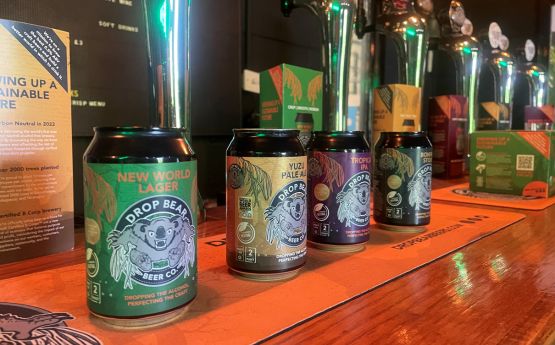
What does a typical day look like for you in your current role?
My day starts very tired. I don't tend to sleep because of my twins. I drink a lot of coffee. I work from home and at the brewery. I always like working at the brewery the most, though, because it's nice to be surrounded by the brand and the team so I generally try to stick to nine to five just to try and obtain a little bit of balance in my life. But it's really hard because my job there isn't a regular day in the life. I do a lot of projects like launching seasonal beers. I'll have that, and that'll be everything I do, and then it's gone. But it's very much dealing with customers, looking at the customer journey, looking at the evolution of the brand, thinking, what are we doing right?
What are we doing wrong? What do we do next? And there's always something to learn, which can be extremely tiring, but it's also very fun and stimulating.
What was the idea behind the name drop bear?
My wife is Australian. We met in Australia, so we wanted to create a brand that reflected us in an abstract and non-narcissistic way. And we've always been drawn to alcoholic craft beer as consumers. What we wanted to do was bring the quirkiness and craftiness of alcoholic craft beer over to alcohol free. We analysed the market, and no one was really doing anything fun at the time. We thought, what can we do? We thought we'd inject a bit of quirkiness. The character of the drop bear has a lot of marketing potential, and it's just a fun, colourful brand that always sparks the question, what is a Drop Bear?
What is a Drop Bear?
Great question. Drop Bears are not real I'm afraid to say. It’s a good alcohol-free beer though. They’re supposedly the carnivorous cousins of koalas. It's a country wide joke that Australians like to play on foreigners. Me, having been one of them. If you ever go to Australia, you'll soon realise that quite literally, everything is trying to kill you. When I was told about these carnivorous koalas that drop from trees and try to attack you, it was very believable, and I did believe it so it's just a bit of tongue in cheek fun playing on our heritage.
What have been some of the biggest challenges in growing the company?
Probably the biggest challenge has been accessing finance. I come from a very working-class background. I didn't have much in savings. When we launched Drop Bear, we had never run a business before. We'd never created a business before. We didn't understand the finances that were required to support that. So that's been a bit of a steep learning curve. So, when we launched, we put literally all of our life savings into the business and quit our jobs. When I look back, this was such a crazy thing to do, but we didn't have any fear at the time, and we were absolutely surprised by the rapid rate of growth that we experienced from day one. We just thought we would launch it and it would just grow organically, but it grew very quickly. We were very aware that we had a decision to make. Did we want to just keep this as something small and just stick to the local Sunday markets or do we want to create a global brand? And that's always been the goal. We knew we needed finance. As two women with no connections or experience, that was hard. We've done multiple fundraising rounds now, and we've raised over £3 million in investment through a mixture of crowdfunding on crowd cube and private investment, but it's been hard. I think just being taken seriously as women in beer is hard enough and then being taken seriously enough to get significant investment, that’s the next level of hard but we got there.
The business started in 2019. A year before Covid-19. How much impact did that have on your business?
A big impact. It is hard to know whether COVID was actually advantageous to the business. In some ways I was trying to be positive, but COVID hit when we just closed our first ever investment round, and one of our key goals that we shared with investors was to really invest and grow the on-trade route, so perhaps bars, restaurants. We'd just hired our first staff members. We commissioned all this work. We were putting all our time into growing that. And then overnight it closed, and we thought, ‘Oh my God, we've just spent all this money.
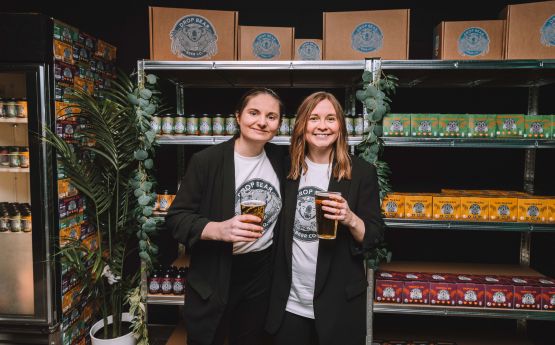
We've just driven the business in this direction, and it's just gone. What do we do?’ We did have one day where we sat in our conservatory and just thought, ‘What do we do now? We can't do everything we plan to do. Our business plan is useless now’, but I think the benefit of it affecting our business so early was that we were flexible, and we were able to pivot. We didn't even have a web shop at the time, so we put a big focus on export to markets that were more open than the UK andit helped us grow by 2,000%. We launched on Amazon, we launched our own web shop, and that allowed us to not only survive but thrive through the pandemic. Another benefit really was our market was growing very quickly. More players were entering, and there's a lot of pay to play so big players coming into the space and taking up a lot of the shelves, or bars. During the pandemic, a lot of consumers shifted online. So, brands had a unique opportunity to engage in a very real way. I think we were able to build this big tribe around the brand that we would have struggled to do so if life had carried on as normal at that time.
How do you convince traditional beer drinkers to try and embrace alcohol free options?
There are two ways to answer this. Number one, don't lecture people, because there is nothing worse than being told that your habits are wrong and that you should be completely different in the way you consume things. No one's going to like that. Our brand is very much “drink if you want, if you don't, here we are”. But the best way to convince someone to give the beer a go is to get to get them to try it. Because I think once people realise that it tastes like beer, that it's made by brewers, that it's supporting jobs, that there's really no compromise at all, it's a bit of a no brainer.
Do you see the alcohol-free market evolving?
It is evolving. It's the fastest growing drinks trend. It has been since before we launched, and that continues today. We are seeing a lot more innovation, the introduction of new styles, supermarkets adopting beers in different ways. When we first launched, it would be normal to see a couple of the big brands such as Heineken. Now you have more independent players, and not only in single cans or bottles, but in larger pack sizes, which just shows that consumers are willing to take on more risk. Data shows that years ago, people would go into Tesco, and they would buy a can, whereas now they happy to go and buy a full pack straight away. They've got that much more faith in the industry. And then obviously there's the evolution of the industry with the introduction of kegs and large packs. I think everyone will agree that having a fresh pint in a pub is the next step for alcohol free.
Sustainability is a major part of your ethos. Why is that so important to you?
I think a lot of brands are jumping on this now. Commercially, it makes sense. Consumers care, even in the cost-of-living crisis, people still care about the world we live in, but from a personal note, Sarah and I are very eco conscious consumers and just individuals ourselves. We've always wanted to create something we can be proud of. “Our little legacy” as we call it. It really needed to reflect the values that we share. It stems from that really.
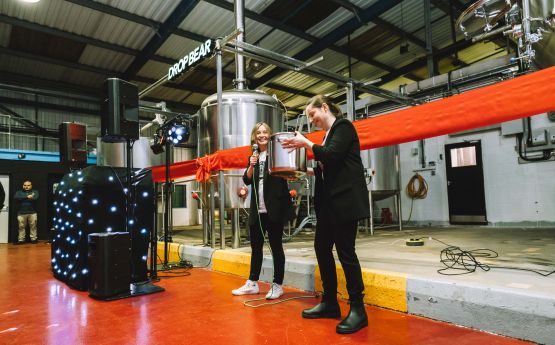
What piece of advice would you give to other entrepreneurs who want to build an ethical business?
I think it's great to want to use your business as a power for good but just make sure everything you do is commercially minded too, because if you can't cover the bills, then you're not helping anything. It always needs to be a balance, and sometimes you do need to make a compromise in the short term. I view things in black and white terms, so that was hard for me to accept. I wanted to be 100% this, but, you know, sometimes you need to be 70% and then you can be 80% the year after.
How has your identity shaped your journey as a business owner?
I'm relatively young. I think the energy that we had was really refreshing to a lot of people we worked with. It's been quite hard to command teams of people who are a lot older than you, sometimes with a lot more experience as well. Managing that dynamic is a challenge, but it's one we've embraced and succeeded in. I think the things that matter to us, gay rights or equal rights for everyone, really, have shaped the business. How ethical the business is, becoming carbon neutral, etc., all stem from our identities.
Do you feel like you're getting into a different stage now? The business is well established now.
- Definitely. We speak to lots of managing business owners and entrepreneurs, you don't realise the impact it has, just existing as gay women in business. The idea of being front and centre on the internet was horrifying for us. But again, during the pandemic, we realised that consumers needed that, so we started to do it. But then when we were going to award ceremonies, we had so many business owners coming up to us and saying how much of a difference it made to the I think with all the hate that's in the world now, it's important to stay loud and be kind. Just show that you can be successful. You can do great things and still be a nice person.
How does it feel to be at the forefront of all of that, being the first LGBTQIA+alcohol-free brewery?
It can be a bit lonely. From a marketing perspective, it's great to be like, ‘Oh, we're the first of this. We're the first of that’. But people don't think about how lonely that can be. There's no one that really understands that unique experience, but I think it's a strong motivator. Lonely, but important, I would say. And I'm hoping it will be less lonely, but who knows?
Do you have any plans to introduce more beers? Are there any seasonal ones you do throughout the year?
Yes, we're hoping this year to have a couple of seasonal beers launching over the summer. We’ve got a cut lager series launching, which is four beers cut with different fruits. So, there's pink grapefruit, raspberry, guava, and peach. I’m not a massive lager drinker personally, but that's another thing. I think people need to always remember in business, it's not about what you want, it's about what your customers want.
You’ve recently acquired the Tomos Watkins brand. What plans do you have to develop their beers? Can you see a merger between the Drop Bear and Tomos Watkins brands?
When we took over, they had a large portfolio of beers that were all in decline, so we wanted to refresh it and refocus the brand. We reviewed everything, and we've reduced the range to five beers. We've kept three of the bestselling, we've introduced two new ones based on market data with growth opportunities. We’ve introduced them in bottle and large packs, casks and keg. I think there are opportunities for seasonality there and collaboration. We've got some interesting ones in the pipeline. Drop Bear is our focus but I'm glad we managed to save Tomos Watkins. It was in serious decline, but it's grown a lot with less beers available. I think sometimes you can just be trying to do too much and lose focus and not do things well.
You've stayed connected with Swansea University since your graduation, what does it mean to have received an honorary fellowship from the university?
It is a massive honour. I would never have imagined, when I went to that open day, that I'd be here with this and an honorary fellowship. Swansea, as an institution, shared all of my values. I’ve stayed in touch and done guest speaking events, panel discussions with business students, etc. The Honorary Fellowship came at a time in my life where I had children and was trying to navigate running a business. You have a major identity crisis, you're trying to look at what the next chapter of your life looks like, who you are, etc. So, to have that level of recognition at a point when I might have been having a crisis of confidence was a great boost that provided some great perspective.
If you could give one piece of advice to anyone looking to enter the food and drinks industry, what would it be?
I like to say that it just escalated, we knew we wanted to do it. I don't remember there ever being a moment where we're like, ‘okay, we're going to 100% commit to this now’, because I think the minute we started, that was it. We knew we were going to make it work. I think if I were going to do it again, I would spend a lot more time planning. Just try to make sure you've got the finances behind you to make it happen, because you don't want to end up spending all your time looking for money and not working on the business, which has been a risk with us at times. Have the money to do what you want and do your research. Again, I see so many people who just want to do something because they want to do it, not because it's a real opportunity to do something. So just make sure that people want what you are proposing, and that you have a real point of difference.
Finally, Joe’s or Verdi’s?
It’s got to be Joe’s.

